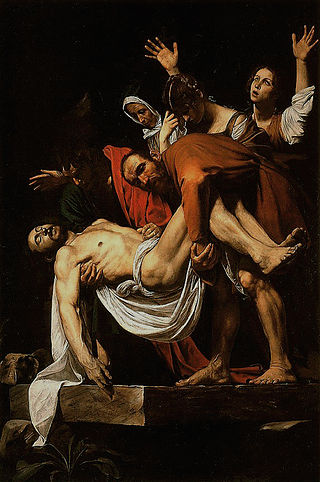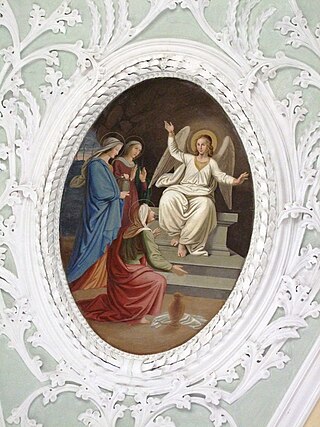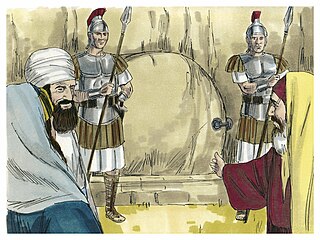
Mark 16 is the final chapter of the Gospel of Mark in the New Testament of the Christian Bible. Christopher Tuckett refers to it as a "sequel to the story of Jesus' death and burial". The chapter begins after the sabbath has ended, with Mary Magdalene, Mary the mother of James, and Salome purchasing spices to bring to the tomb next morning to anoint Jesus' body. There they encounter the stone rolled away, the tomb open, and a young man dressed in white who announces the resurrection of Jesus. The two oldest manuscripts of Mark 16 conclude with verse 8, which ends with the women fleeing from the empty tomb, and saying "nothing to anyone, because they were too frightened".

The stolen body hypothesis posits that the body of Jesus Christ was stolen from his burial place. It theorises that his tomb was found empty not because he was resurrected, but because the body had been hidden somewhere else by the apostles or unknown persons. Both the stolen body hypothesis and the debate over it presume the basic historicity of the gospel accounts of the tomb discovery. The stolen body hypothesis finds the idea that the body was not in the tomb plausible – such a claim could be checked if early Christians made it – but considers it more likely that early Christians had been misled into believing the resurrection by the theft of Jesus's body.

Matthew 28 is the twenty-eighth and final chapter of the Gospel of Matthew in the New Testament. This chapter records that Jesus is risen, describes the actions of the first witnesses to this event, and ends with the Great Commission.

Matthew 7:19 and Matthew 7:20 are the nineteenth and twentieth verses of the seventh chapter of the Gospel of Matthew in the New Testament and are part of the Sermon on the Mount. The verses continue the section warning against false prophets.

Matthew 28:4 is the fourth verse of the twenty-eighth chapter of the Gospel of Matthew in the New Testament. This verse is part of the resurrection narrative; describing the reaction of the tomb guards after the arrival of the angel of the Lord and the occurrence of an earthquake that opened the tomb.

Matthew 28:7 is the seventh verse of the twenty-eighth chapter of the Gospel of Matthew in the New Testament. This verse is part of the resurrection narrative. An angel has appeared at the empty tomb and in this verse he continues his instructions to Mary Magdalene and "the other Mary".

Matthew 28:8 is the eighth verse of the twenty-eighth chapter of the Gospel of Matthew in the New Testament. This verse is part of the resurrection narrative. Mary Magdalene and "the other Mary" had just encountered an angel who has appeared at the empty tomb of Jesus, and in this verse they leave to bear the angel's message.

Matthew 28:9 is the ninth verse of the twenty-eighth chapter of the Gospel of Matthew in the New Testament. This verse is part of the resurrection narrative. Mary Magdalene and "the other Mary" are leaving the empty tomb of Jesus after encountering an angel, and in this verse they encounter the risen Jesus.

Matthew 28:10 is the tenth verse of the twenty-eighth chapter in the Gospel of Matthew in the New Testament. This verse is part of the resurrection narrative. Having left the empty tomb, Mary Magdalene and "the other Mary" are on their way to meet the other disciples, when Jesus meets with them. In this verse the risen Jesus speaks with them.
Matthew 28:11 is the eleventh verse of the twenty-eighth chapter of the Gospel of Matthew in the New Testament. This verse is part of the resurrection narrative. In this verse some of the guards at the tomb return to Jerusalem to report to the chief priests.
Matthew 28:12 is the twelfth verse of the twenty-eighth chapter of the Gospel of Matthew in the New Testament. This verse is part of the resurrection narrative. In this verse the guards of the tomb, after being present for an angel hearkening the resurrection, are bribed by the priests to lie about what they saw.
Matthew 28:13 is the thirteenth verse of the twenty-eighth chapter of the Gospel of Matthew in the New Testament. This verse is part of the resurrection narrative. In this verse the guards of the tomb, after being present for an angel hearkening the resurrection, were told what to say by the priests of Jerusalem after being bribed.
Matthew 28:14 is the fourteenth verse of the twenty-eighth chapter of the Gospel of Matthew in the New Testament. This verse is part of the resurrection narrative. In this verse the priests of Jerusalem assured the safety of the tomb guards should the governor, Pontius Pilate, receive report of their failure.

Matthew 27:65–66 are the final two verses of the twenty-seventh chapter of the Gospel of Matthew in the New Testament, coming after the crucifixion and entombment of Jesus. The chief priests and the Pharisees meet with Pontius Pilate, and he approves their request for a tomb guard.

Matthew 27:63 is the sixty-third verse of the twenty-seventh chapter of the Gospel of Matthew in the New Testament. This verse occurs after the crucifixion and entombment of Jesus. In it the chief priests and the Pharisees are meeting with Pontius Pilate.

Matthew 27:62 is the sixty-second verse of the twenty-seventh chapter of the Gospel of Matthew in the New Testament. This verse occurs after the crucifixion and entombment of Jesus. In it the leaders of the Jewish community meet with Pontius Pilate.

Matthew 27:61 is the sixty-first verse of the twenty-seventh chapter of the Gospel of Matthew in the New Testament. This verse describes two women waiting by the Tomb of Jesus after the crucifixion.

Matthew 27:60 is the sixtieth verse of the twenty-seventh chapter of the Gospel of Matthew in the New Testament. This verse describes the Entombment of Jesus by Joseph of Arimathea after the crucifixion.

Matthew 27:57 is the fifty-seventh verse of the twenty-seventh chapter of the Gospel of Matthew in the New Testament. This verse begins a discussion of the burial of Jesus and introduces Joseph of Arimathea.

Matthew 27:55–56 are the fifty-sixth and fifty-seventh verses of the twenty-seventh chapter of the Gospel of Matthew in the New Testament. The crucifixion and death of Jesus have just occurred, and these verses make note of a group of women who were present at that event.
















